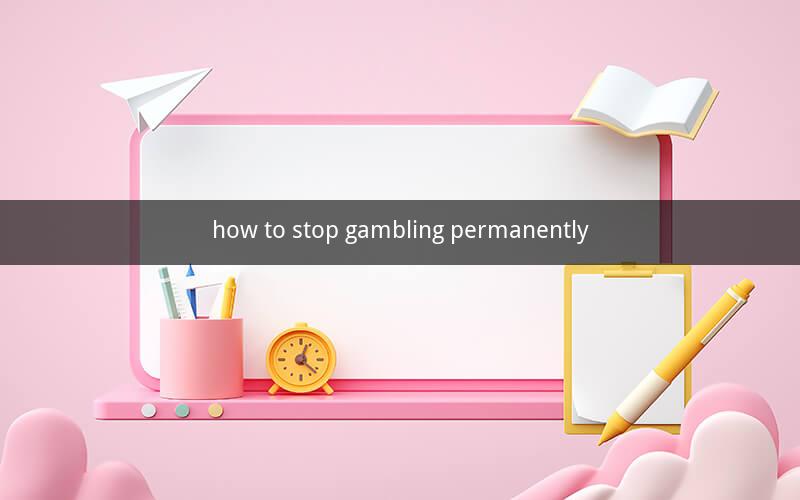
How to Stop Gambling Permanently
Table of Contents
1. Understanding the Problem
2. Identifying the Triggers
3. Seeking Professional Help
4. Building a Support System
5. Developing Coping Strategies
6. Setting Financial Boundaries
7. Engaging in Alternative Activities
8. Mindfulness and Meditation
9. Taking Responsibility for Your Actions
10. Celebrating Milestones
1. Understanding the Problem
To stop gambling permanently, it is crucial to first understand the nature of the problem. Gambling addiction is a complex issue that affects both the individual and their loved ones. It is characterized by an inability to control gambling behavior, despite negative consequences. Understanding the underlying causes and the psychological aspects of gambling addiction is the first step towards overcoming it.
2. Identifying the Triggers
Identifying the triggers that lead to gambling behavior is essential for long-term recovery. Triggers can be external, such as financial stress or social situations, or internal, such as boredom or anxiety. By recognizing these triggers, individuals can develop strategies to avoid them and prevent relapse.
3. Seeking Professional Help
Seeking professional help is a vital step in overcoming gambling addiction. Therapists specializing in addiction can provide personalized treatment plans, including cognitive-behavioral therapy (CBT) and other evidence-based techniques. Professional help can also provide a safe and supportive environment for individuals to address their addiction and develop healthy coping mechanisms.
4. Building a Support System
Building a support system is crucial for long-term recovery. This can include family, friends, or support groups such as Gamblers Anonymous. Having a strong support network can provide emotional support, encouragement, and accountability, making it easier to stay on track and resist the urge to gamble.
5. Developing Coping Strategies
Developing healthy coping strategies is essential for managing the cravings and triggers that lead to gambling. These strategies can include exercise, hobbies, meditation, and other activities that provide a sense of fulfillment and distraction from the urge to gamble. Finding alternative ways to cope with stress and boredom can significantly reduce the likelihood of relapse.
6. Setting Financial Boundaries
Setting financial boundaries is crucial for preventing financial ruin and supporting long-term recovery. This can involve setting a strict budget, avoiding access to gambling sites and venues, and seeking financial counseling if necessary. By taking control of your finances, you can reduce the temptation to gamble and focus on rebuilding your life.
7. Engaging in Alternative Activities
Engaging in alternative activities can help fill the void left by gambling and provide a sense of purpose and fulfillment. This can include joining clubs, volunteering, pursuing a new hobby, or learning a new skill. Finding activities that bring joy and satisfaction can help reduce the urge to gamble and promote a healthier lifestyle.
8. Mindfulness and Meditation
Mindfulness and meditation can be powerful tools in overcoming gambling addiction. These practices help individuals become more aware of their thoughts and emotions, allowing them to recognize and address the triggers that lead to gambling. By practicing mindfulness and meditation regularly, individuals can develop a greater sense of self-control and resilience.
9. Taking Responsibility for Your Actions
Taking responsibility for your actions is a crucial step in overcoming gambling addiction. This involves acknowledging the harm caused by your gambling behavior, making amends where possible, and committing to change. By taking responsibility, you can begin to rebuild trust with yourself and others and move forward towards a healthier, more fulfilling life.
10. Celebrating Milestones
Celebrating milestones is an important part of the recovery process. Recognizing and celebrating your progress can help maintain motivation and provide a sense of accomplishment. Whether it's a week, a month, or a year without gambling, take the time to acknowledge your hard work and dedication.
Questions and Answers
1. What are the signs of a gambling addiction?
- Signs of a gambling addiction can include increased time spent gambling, neglecting responsibilities, lying about gambling activities, and experiencing financial, emotional, or legal problems due to gambling.
2. How can I tell if I am a problem gambler?
- You may be a problem gambler if you find yourself chasing losses, gambling to escape problems, or feeling restless or irritable when not gambling.
3. Can I overcome a gambling addiction on my own?
- While it is possible to overcome a gambling addiction on your own, seeking professional help and joining support groups can significantly increase your chances of success.
4. What is the most effective treatment for gambling addiction?
- The most effective treatment for gambling addiction is often a combination of cognitive-behavioral therapy (CBT), medication, and support groups.
5. How can I stay motivated during the recovery process?
- Staying motivated during the recovery process can be challenging, but setting small, achievable goals, celebrating milestones, and maintaining a strong support system can help keep you on track.
6. Can gambling addiction be cured?
- While there is no cure for gambling addiction, it can be effectively managed and overcome with the right treatment and support.
7. How long does it take to overcome a gambling addiction?
- The duration of recovery from gambling addiction can vary for each individual, but many people find that they need ongoing support and treatment for several years.
8. What can I do if I relapse?
- If you relapse, it is important to acknowledge the setback and seek help. Reconnecting with your support system, revisiting your treatment plan, and learning from your mistakes can help you get back on track.
9. How can I help a loved one with a gambling addiction?
- You can help a loved one with a gambling addiction by offering support, encouraging them to seek professional help, and being patient and understanding.
10. Is it possible to prevent a gambling addiction?
- While it is not possible to completely prevent a gambling addiction, being aware of the risks, setting limits, and being cautious about your gambling behavior can help reduce the likelihood of developing an addiction.